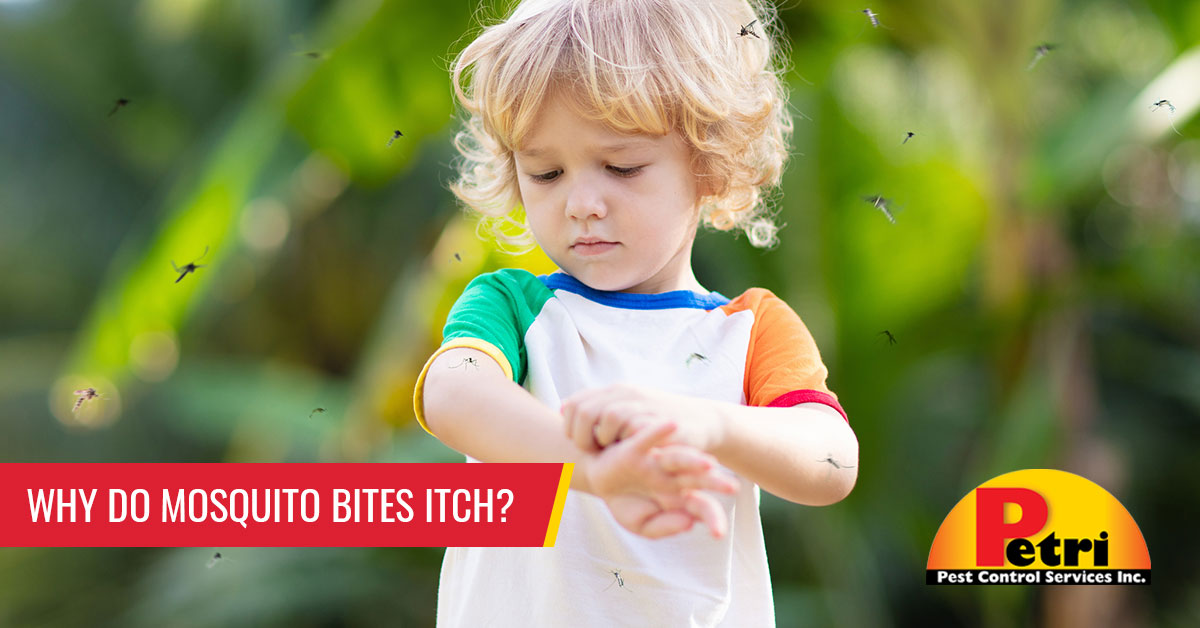
In this guide, we provide answers to the itching questions you’ve always had about mosquito bites . . . Why do they itch more at night? Why do they itch at all? Why do they itch more on your feet? How long will they itch? What can you do to calm the itch, and how do you avoid bites in the first place? We will also discuss individual protection, in addition to protecting your entire home.
Mosquito Season is On
It’s mosquito season in South Florida and it is time to get proactive about fending off these blood-sucking pests that can transmit Zika virus, Dengue fever, West Nile virus, malaria, and other diseases to humans as well as transmitting heartworms to dogs and cats. Female mosquitoes need a blood meal for their eggs to develop and mature. This is where we come into the mosquito-verse! Attracted to the carbon dioxide humans and pets exhale, female mosquitoes land on our extremities, slice open our skin with bristles, then find a small capillary or blood vessel to extract blood from for their eggs. Inserting two tubes into the blood source, one tube extracts blood, while saliva flows through the other tube, acting as an anticoagulant.
Why Do Mosquito Bites Itch?
Mosquito bites itch because proteins in mosquito saliva cause the human immune system to react when bitten. This produces histamines that cause the nerves in the skin to itch due to increased blood flowing to the affected area. When the body releases too much histamine, the skin around the bite site can swell up and turn red, on top of itching. Scratching mosquito bites only further inflames and irritates the skin around the bite, causing mosquito bites to itch more and adding the possibility of an infection if the skin is broken.
But Why Do Mosquito Bites Itch More at Night?
Various mosquito species feed at different times of the day, usually at dusk and sunrise, while some more aggressive species feed during the daytime and at night. The main reasons mosquito bites are itchier at night involve the fact that at night, humans release more carbon dioxide into the air than in the daytime and mosquitoes bite more often. Mosquitoes can attach better to humans at rest when reflex times are slower in sleeping humans than during the day when humans are active.
So mosquito bites may seem to itch more at night because when the body is at rest, but the mind is still active, the attention is drawn more to the itching sensation than it is during the day when humans are more engaged and active with their attention on other things.
Why Do Mosquito Bites Itch More on Your Feet?
It is not necessarily that mosquito bites itch more on your feet but that mosquitoes attack more around extremities, such as the ankles and feet. Even though mosquitoes are attracted to the carbon dioxide humans expel, female mosquitoes have learned that flying directly into human mouths never ends well for them, as that course of action will, in all likelihood, thwart their mission to indulge in a blood meal to reproduce. When mosquitoes sense carbon dioxide, they know where to head to fulfill their missions but then are attracted to smellier areas of human bodies, such as feet. According to an NPR Goats and Soda feature, mosquitoes often target the extremities because ankles and feet emit smells they are attracted to and are often exposed. “Mosquitoes who bite victims on their ankles and feet are less likely to get smacked or swatted away,” Unversity of California at Riverside entomologist Anandasankar Ray says.
How Do You Stop the Itching?
Itching from mosquito bites can be managed either by placing a cold compress on the affected area, applying calamine lotion, or applying over-the-counter corticosteroids to the affected area. Other DIY remedies include:
- Taking over-the-counter antihistamines
- Soaking your bites in a colloidal oatmeal bath or making a mask of colloidal oatmeal and water, and placing it on the bite
- Placing steeped and chilled green or black tea bags on the bites to relieve the swelling and itching due to tea’s anti-inflammatory properties
- Making a rub with basil leaves and coconut oil or just rubbing basil leaves on your bites may offer relief
- Diluting minced garlic with fractionated coconut oil and rubbing it on your bites can relieve itching
- Using aloe vera leaf to soothe the affected skin
However, in sensitive individuals, mosquitoes can cause severe allergic reactions. Seek immediate medical attention when you or someone around you is bitten by a mosquito and you notice any of the following:
- Breaking out in hives
- Experiencing difficulty breathing
- Wheezing
- Throat closing up
These are indications of anaphylactic shock, which can prove life-threatening if not treated. Incidents of anaphylactic shock caused by a mosquito bite are rare and more commonly caused by other stinging insects, such as bees, wasps, and hornets. For the most part, mosquito bites itch for a few days and then disappear but some can leave dark marks on skin, depending on the individual.
So How Do You Avoid Getting Mosquito Bites?
People can take precautions to avoid mosquito bites. Wearing long pants and shirts in the evening and the morning in the summer can help prevent mosquitoes from attacking you. Spraying an insecticide containing DEET on your clothing can fool mosquitoes’ sensitive receptors, making them unable to detect carbon dioxide and other chemicals. Vanderbilt University biologist, Larry Zwiebel, studies mosquito behavior and is working on a way to use mosquitoes’ highly sensitive scent receptors against them. “At my lab, we’re learning what turns on the molecular receptors on the mosquito’s antennae — that’s how they perceive scent, ” he explains, “and we’re researching ways to overwhelm those receptors and confuse the mosquitoes.” The idea focuses on overstimulating the mosquito’s whole sensory system with this compound and basically just “shutting it down.”
In Your Backyard
When mosquitoes in your backyard are making your life miserable, professional pest control companies offer spraying services to reduce mosquito numbers in your backyard. Eliminating mosquitoes in your South Florida backyard permanently can be achieved with innovative technology, In2Care. It can be installed in your yard by professional pest control companies, such as Petri Pest Control Services. An eco-friendly solution, when In2Care bait stations are installed in your yard, pregnant female mosquitoes are lured to a resting space in a recycled polyethylene trap, where they are contaminated with bait that contains bio-active ingredients that kill the mosquitoes and their eggs in the larval stage. Replacing the water and active ingredients in the trap every 6-8 weeks will keep your yard mosquito-free for years.
Petri Pest Control Services
Family-owned and operated since 1956, Petri Pest Control Services is your local pest control company. A full spectrum pest control company, specializing in perimeter treatments, Petri Pest Control Services provides affordable and reliable pest control services to South Florida homes and businesses from our offices in Boynton Beach and Pompano Beach. Don’t let mosquitoes make you itch this summer – contact us to schedule your mosquito reduction service today.
Why Do Mosquito Bites Itch? Your Guide To All The Questions You’ve Been Itching To Ask in South Florida
Serving Broward County and Palm Beach County


